Huawei and Wenjie Part Ways, Seres Embarks on a Journey
![]() 07/08 2024
07/08 2024
![]() 571
571
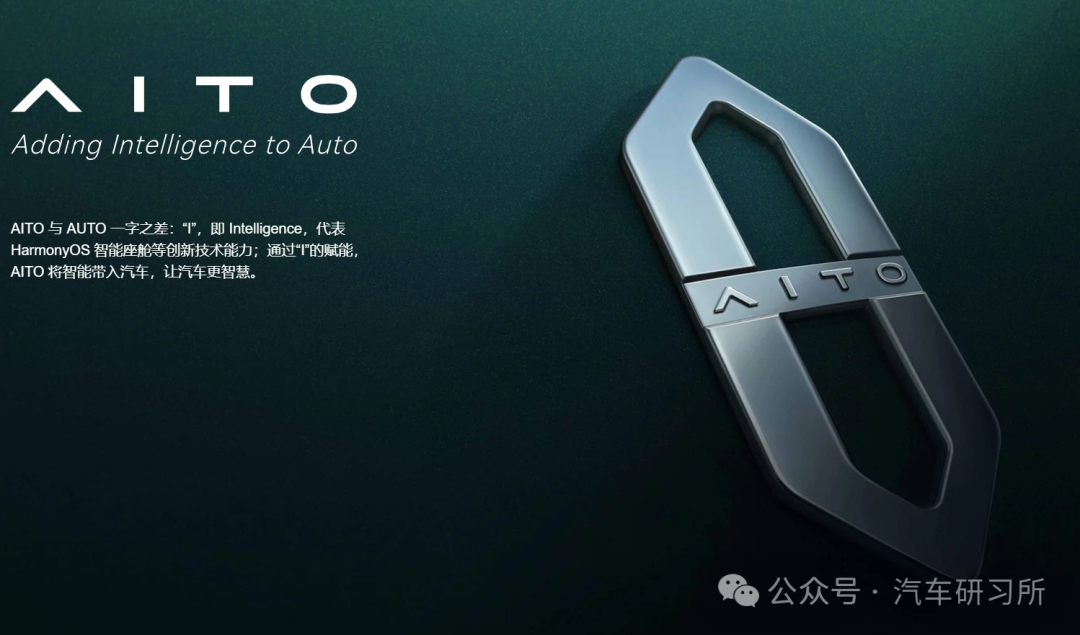
Huawei and Wenjie have since become separate entities.
On the evening of July 2, Seres issued an announcement stating that its controlled subsidiary had acquired the trademark "Wenjie" and 44 design patents from Huawei and its affiliates for a transaction amount of 2.5 billion yuan.
After the announcement was released, Huawei and Seres immediately became trending topics on social media.
Some self-media personalities also expressed their views almost simultaneously, believing that Huawei selling the "Wenjie" trademark and patents for 2.5 billion yuan was proof that Huawei was once again reaffirming its position of not manufacturing cars, while also being a practical move to fully empower Seres in car manufacturing.
If we look at it from this perspective, Huawei's transfer of the "Wenjie" trademark and patents to Seres does indeed give "Wenjie" a formal identity - legally speaking, "Wenjie" now belongs solely to Seres and no longer has any affiliation with Huawei.
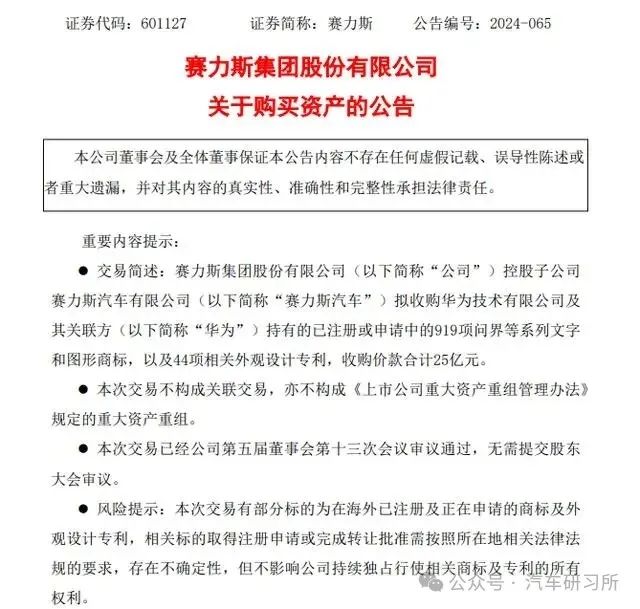
Huawei sells "its child," and "Wenjie" happily gains a new identity
In the past, the identity of "Wenjie" has always been awkward.
Saying that it has no relationship with Huawei, yet the trademark is in Huawei's hands; saying that it has a relationship with Huawei, yet Ren Zhengfei and Huawei's senior management (except Yu Chengdong) have all stated publicly that "Huawei does not manufacture cars."
A company that claims not to manufacture cars yet registers trademarks related to its automotive business has led many media professionals to interpret Huawei's statement of "not manufacturing cars" as a way to avoid sanctions risks.
Especially after "AITO Wenjie" was renamed "HUAWEI Wenjie" on March 8, 2023, some people were even more convinced that Huawei had to manufacture this car, with the biggest reason being the prominent "HUAWEI" in "HUAWEI Wenjie".
With the "Wenjie" trademark registered and the automotive business renamed with a high "Huawei content," wasn't this still manufacturing cars?
However, just over twenty days after the renaming incident, Ren Zhengfei personally signed and issued the "Resolution on Huawei Not Manufacturing Cars," once again reaffirming Huawei's basic strategy of not manufacturing cars and emphasizing that the Huawei logo was not allowed to appear on vehicle promotions and exteriors. Only then did the rumor of "Huawei entering the car manufacturing industry" temporarily subside.
But even though the rumors were temporarily quelled, Huawei, which did not manufacture cars, still held the "Wenjie" trademark, which was still difficult to convince the public.
However, regarding this question that still exists in the minds of consumers, Huawei has this time proven its determination not to manufacture cars with practical actions - Huawei has transferred the "Wenjie" trademark and related patents to Seres for 2.5 billion yuan.
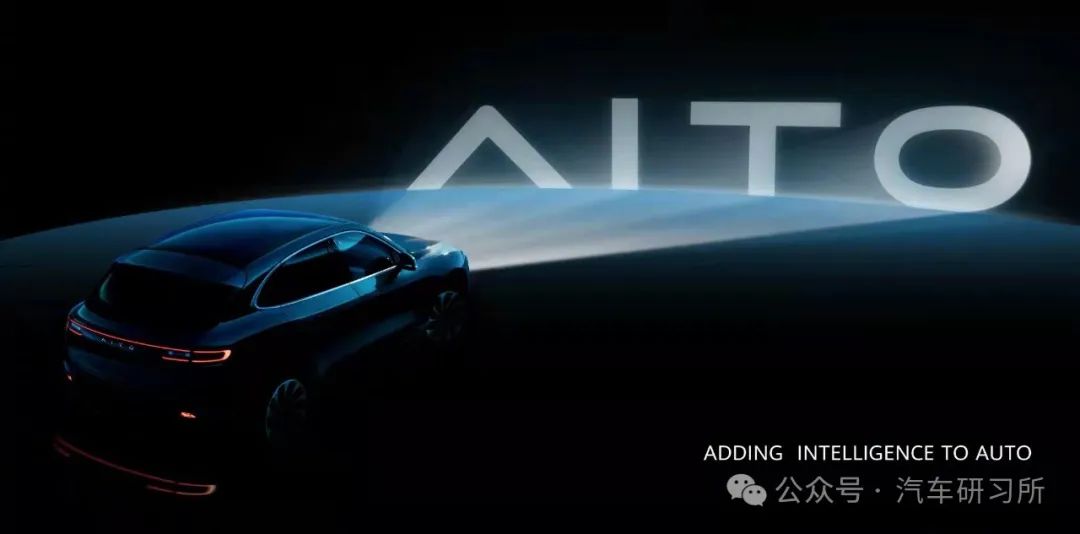
Now, Huawei no longer holds intangible assets such as the "Wenjie" trademark and patents, and no longer has any affiliation with Wenjie, truly reaffirming its determination not to manufacture cars.
This is also where most self-media outlets believe Huawei has vision and breadth of mind - not only addressing public doubts through actions but also only charging a "friendly price" for the transfer, considering that the market valuation of Wenjie-related assets was reported by Caixin to be as high as 102.3 billion yuan. This transfer for only 2.5 billion yuan can almost be described as "making a friend."
From the perspective of Ren Zhengfei and Huawei's official statements, this transaction once again confirms Huawei's position of not manufacturing cars and is a reiteration of Ren Zhengfei's strategy of not manufacturing cars.
For Wenjie and Seres, this transaction also means that the "Wenjie" brand, which has been subject to identity doubts, now has a well-deserved formal identity.
The "Wenjie" model, Ren Zhengfei's vast universe
In the Chinese automotive market, Huawei is not the first brand to design car manufacturing operations, and Wenjie is not the first newly established automotive brand.
Long before Huawei and Wenjie, countless new car manufacturing forces emerged like mushrooms after a rain, only to fall silent later. Even the few brands that still exist today are mostly engaged in a balancing act between huge losses and profitability.
Whether Huawei could break free from this curse if it entered the car manufacturing industry directly is uncertain.
Compared to the life-and-death struggle among various new car manufacturing forces, Ren Zhengfei's goal is clearly not just to survive - becoming China's Bosch or possibly aligning more closely with Huawei's long-term goals, strategic vision, and corporate ethos.
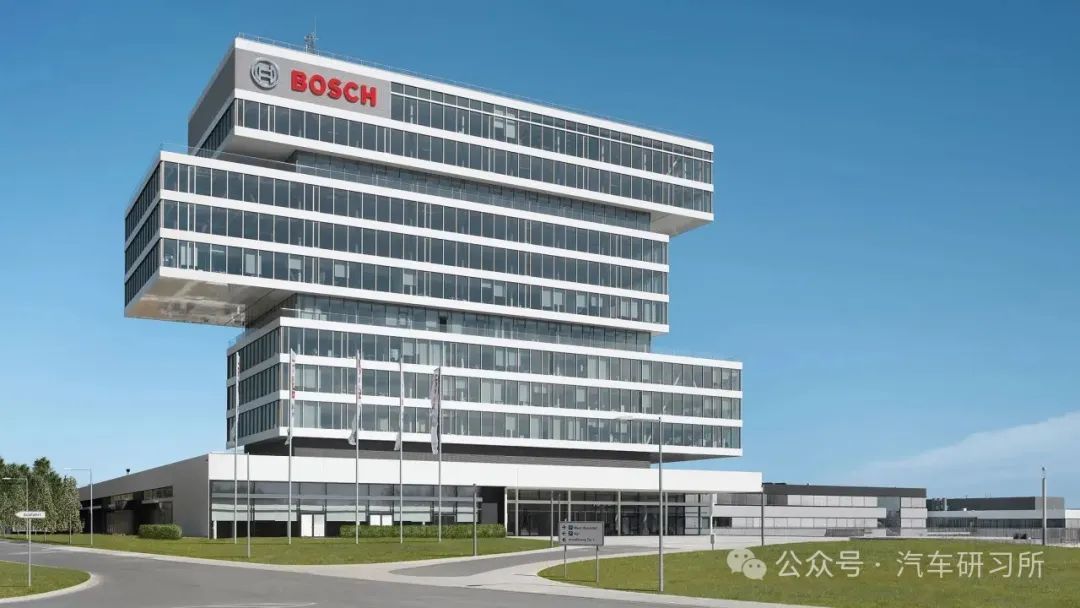
Bosch Group is the world's most well-known supplier in the automotive industry, with a history of nearly 140 years. In terms of business, Bosch has integrated different industrial chains in the automotive industry, providing integrated solutions and services for parts to different automakers worldwide.
In terms of the market, Bosch has become the world's largest automotive technology supplier, with over 420,000 employees and operations in more than 50 countries and regions worldwide. In 2022, its sales revenue reached 88.4 billion euros. With this performance, Bosch ranked 58th on Hurun's World 500 list in 2022.
Bosch does not manufacture cars itself but provides integrated parts services to other automakers. Any industry chain and brand involved in car manufacturing can become Bosch's customers.
Bosch's integrated parts solutions and customers have no upper limit, with vast market and imagination space. Moreover, Bosch is not a competitor of any automaker but rather a partner in the industrial chain. The relationship between Bosch and automakers is more about cooperation and empowerment.
If Bosch manufactured cars itself, it would become a competitor of every automaker.
Now, the same is true for Huawei - if Huawei enters the car manufacturing industry directly, it would become a potential competitor of every automaker. But if Huawei does not manufacture cars itself but provides integrated parts services to other automakers, similar to Bosch, then Huawei can become a partner of any automaker.
Looking at the future from the present, Ren Zhengfei's vast universe is clearly defined.
Separating from Huawei, "Wenjie" may have a better future
In the past, "Wenjie" under the Huawei brand was a mixed bag.
The good news is that with Huawei's brand endorsement, Wenjie attracted a wave of Huawei fans. Compared to other emerging brands, Wenjie has intricate ties with Huawei, a large and established brand, which naturally brings many benefits from a branding and marketing perspective.
However, as a brand that directly cooperates with Huawei, which does not manufacture cars, "Wenjie" has also been repeatedly misunderstood as Huawei's "scapegoat." In the previous car accident in Yuncheng, Shanxi, many netizens believed that Wenjie had the identity of "Huawei when it comes to credit, Wenjie when it comes to blame."
With the completion of this trademark and patent transfer, the brand identity of "Huawei is Huawei, Wenjie is Wenjie" may change this brand misperception of Wenjie.
Moreover, from a long-term development perspective, Wenjie, separated from Huawei's identity, may enjoy broader freedoms and market space in the future. Huawei's previous "cutting off one's arm to save one's life" with Honor is a reference case with evidence.
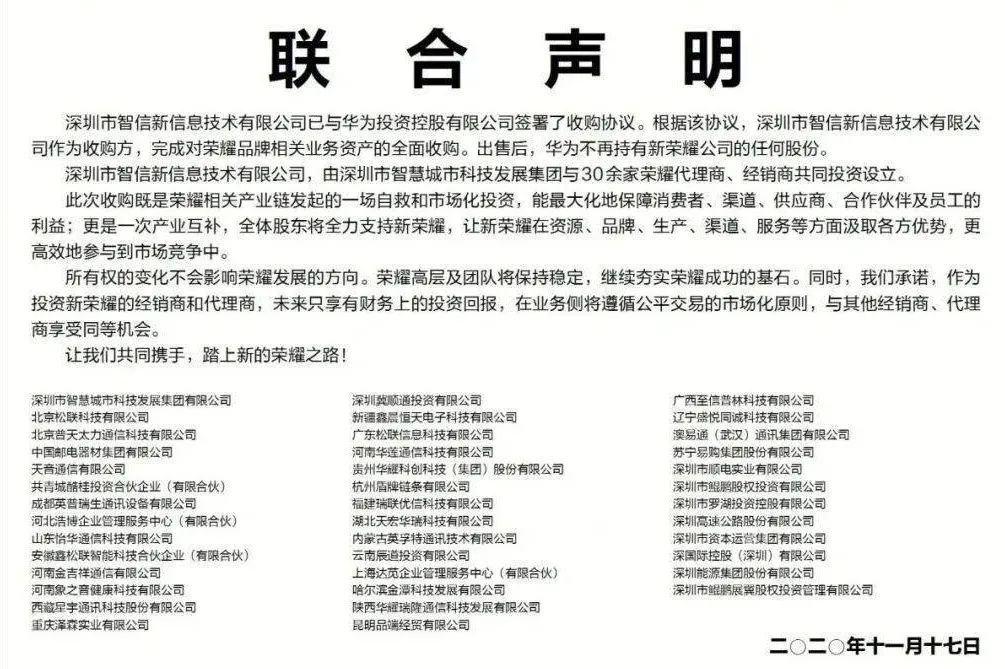
In 2019, Huawei officially faced comprehensive sanctions pressure and, under duress, chose to sell its sub-brand mobile phone Honor. Since then, Honor, separated from Huawei, has broken new ground in product innovation and market expansion, embarking on a completely different brand path.
According to third-party research data, Honor achieved a comprehensive breakthrough in overseas markets in 2023, with growth exceeding 200% and up to 300% in the European market, achieving profitable growth within two years. In the Chinese market, according to the first-quarter mobile phone tracking report released by IDC, Honor successfully took the first place with a market share of 17.1%, representing a year-on-year increase of 13.2%.
Honor's personal experience shows that breaking away from Huawei and forging ahead with innovation may be a new future.
The same may be true for "Wenjie," which has just separated from Huawei.






